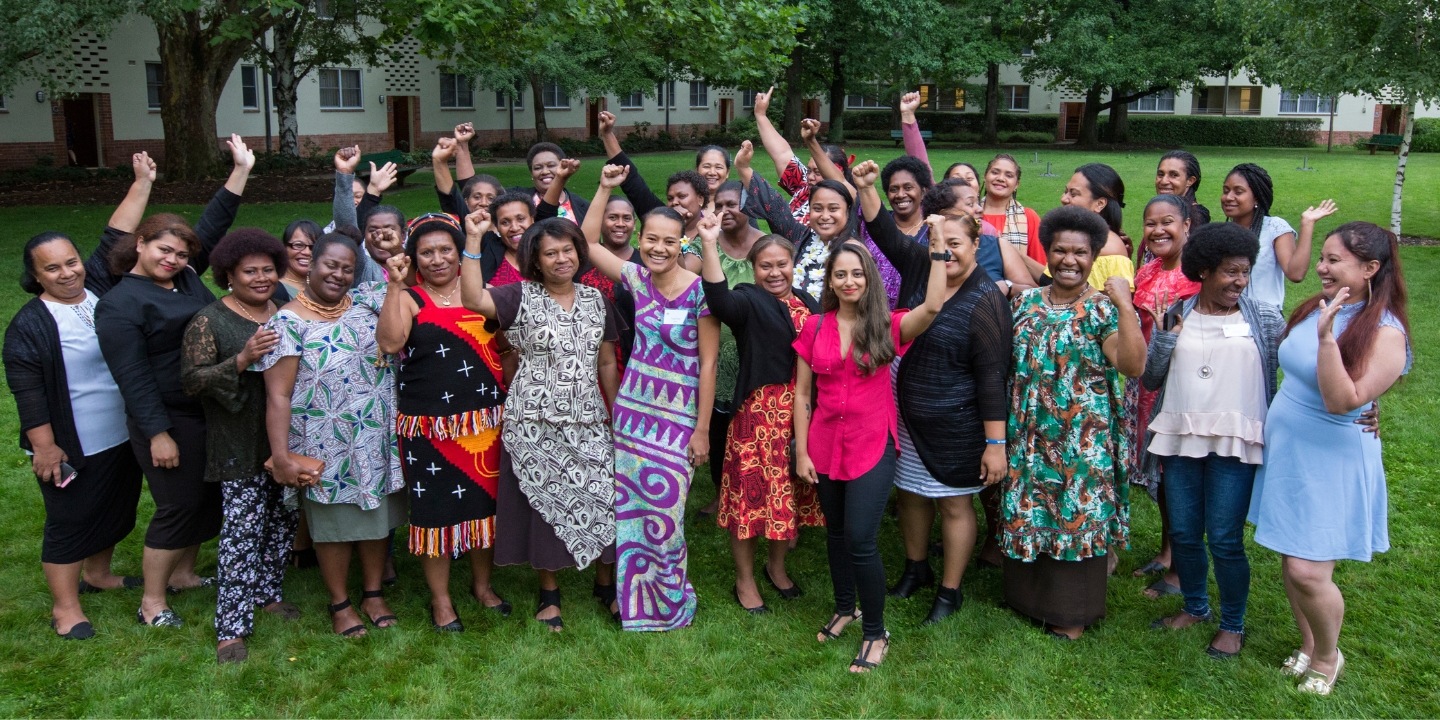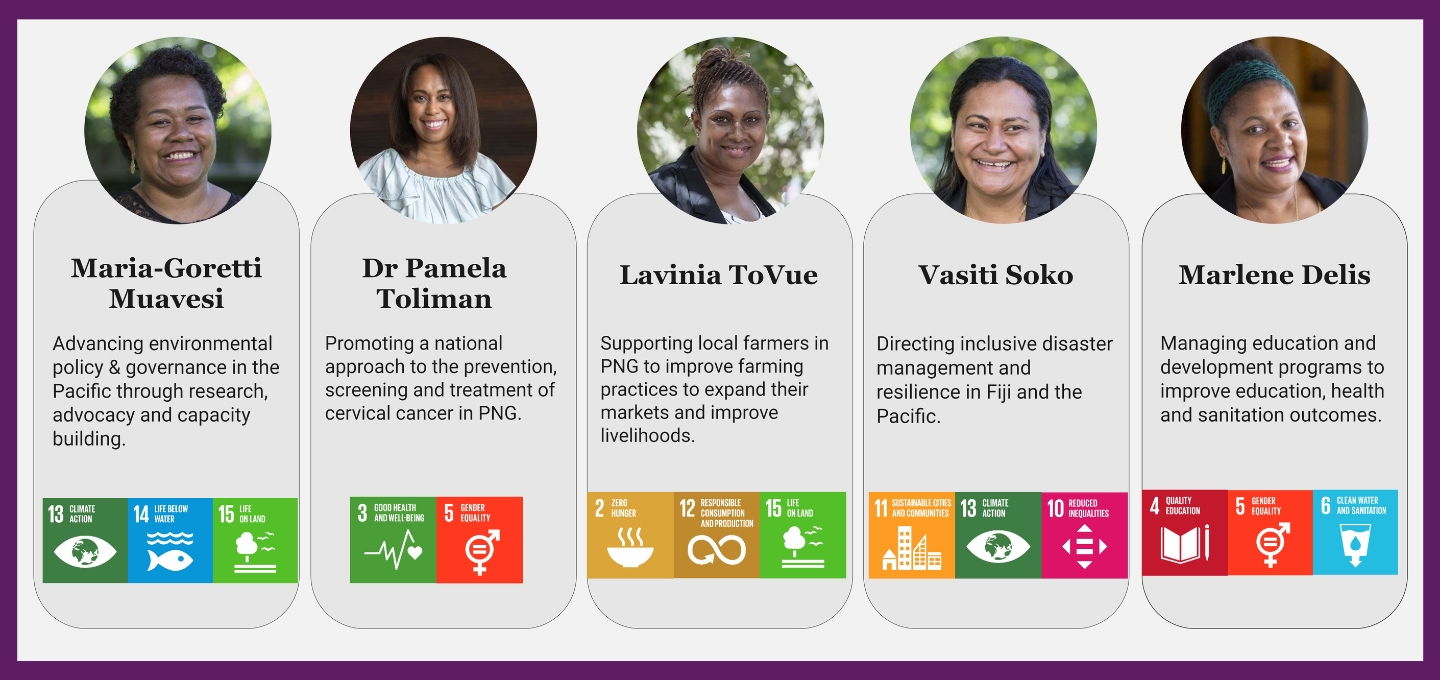
The sisterhood securing a sustainable future: an Australia Awards story
ACER news 30 May 2024 7 minute readA network of peers is supporting a dynamic group of women to pursue change in the Pacific. New research looks at the interactions of more than 50 leaders to see how it's done.
Women who took part in an Australian leadership program have connected in a ‘coalition of support’ after returning to their home countries, new research shows.
The Australia Awards Global Tracer Facility (GTF) – managed by the Australian Council for Educational Research on behalf of the Australian Department of Foreign Affairs and Trade – undertook the 2-phase research project to see how networks are being used to support and drive change.
The GTF followed more than 50 women who took part in the Australia Awards enrichment program, Women Leading and Influencing (WLI), between 2017 and 2019. The WLI program is designed to build the confidence and connections of participants as well as their leadership skills in sustainable development.
The first phase of the GTF research involved a social network analysis of connections between participants in the first 3 WLI cohorts, 4 to 6 years after completing the program. It found that 83% were in collaborative relationships with a WLI peer.
Based on motivation for sustainable change, this ‘sisterhood’ provided a safe and trusted network where women could seek advice and assurance, share expertise, learn about different contexts and find new professional connections, the research showed.
In examining the interactions of 56 WLI alumnae, researchers found they all remained connected with Australia, and a majority had ‘clear aspirations and strategies about how they want to lead and influence change’.
The research also identified 12 highly active women operating as mentors and coaches in their peer groups, or ‘brokers’ of information.
Phase 2 of the research involved in-depth interviews with 5 key changemakers identified in the social network analysis, providing further insight about their leadership styles, influence and development contributions.

The research shows the 5 women are making a ‘significant contribution’ through leadership in areas such as disaster management, the environment, health, education, food security and economic prosperity.
Vasiti Soko, Fiji’s first female director of the National Disaster Management Office, was part of the third WLI cohort. Ms Soko describes the broader network as ‘a big sisterhood’.
‘Even though we’re all in significant positions, because of the relationship that’s been established, we can talk on the side and talk about issues that could assist each other in … our work,’ Ms Soko said.
In their professional roles and volunteering, the researchers found these WLI leaders ‘use the WLI sisterhood as a trusted space or network to activate coalitions of support’ and drive developmental change.
While working in demanding roles, Ms Soko, and WLI peer Maria-Goretti Muavesi, the Head Environmental Legal Officer at the International Union for Conservation of Nature Oceania regional office, had also connected during the pandemic to support rural women who had lost their income in Fiji.
Drawing on a WLI leadership fund and working with 3 other alumnae, they responded to the rural women’s needs by conducting a donation drive for sanitary and maternity pads, working with community groups to make reusable pads, and promoting distribution of vegetable seeds for food security.
In Papua New Guinea, 3 WLI colleagues ran a hygiene project for primary schools that improved handwashing, supported by the supply of water tanks, and engaged the community in making reusable face masks.
Insight into the leadership styles of the women comes from their assessments of why their peers considered them to be well-connected leaders as discovered by the social network analysis.
Behaviours included being genuine, using networks to educate and engage with people in a meaningful way, seamlessly building trust and rapport, taking the time to talk and listen, and making an effort to meet people trying to make a difference – no matter how big or small their endeavours.
Being willing to share, create learning spaces and ‘platforms where we’re able to share and learn from each other’ was also seen as a reason one woman believed she had been identified in the first phase of the research as a leader.
‘The relationships formed through the WLI experience are observed to be based on trust and mutual responsibility, entrenched in the values of providing service to others, genuine caring and compassion,’ the researchers say.
‘Alumnae attributed the WLI network as being essential to fostering relationships with like-minded women around the Pacific, fostering a sense of connection to know each other’s interest and expertise to enable change.’
The value of the sisterhood to its members can be seen in context, with female leaders rare and the political representation of women in the Pacific region among the lowest in the world.
As part of the discussion on the gender imbalance, a photograph of Ms Soko showing her to be the sole woman in a group of male advisers to the prime minister has been used in Fiji schools.
Like others in the group, Ms Soko’s leadership includes a heightened awareness of being a good role model ‘because I know I’m not only doing it for me, I’m doing it for the women that will come after me’.
More information:
The GTF is funded by the Australian Department of Foreign Affairs and Trade to assess the impact of the Australia Awards in developing enduring relationships and supporting countries to achieve their sustainable development goals.
Read the Phase 1 report: Developmental leadership for women in the Pacific: Cultivating networks for change in Australia Award WLI alumni, by Sarah Buckley, Leyna Clarke and Jo Doyle.
Read the Phase 2 report: Developmental leadership for women in the Pacific: WLI alumnae reflections and insights, by Michelle Hsien, Jo Doyle and Sarah Buckley.
Visit the ACER website to learn more about how our work supports policymakers, leaders and educators to improve educational policy and practice for learners around the world.